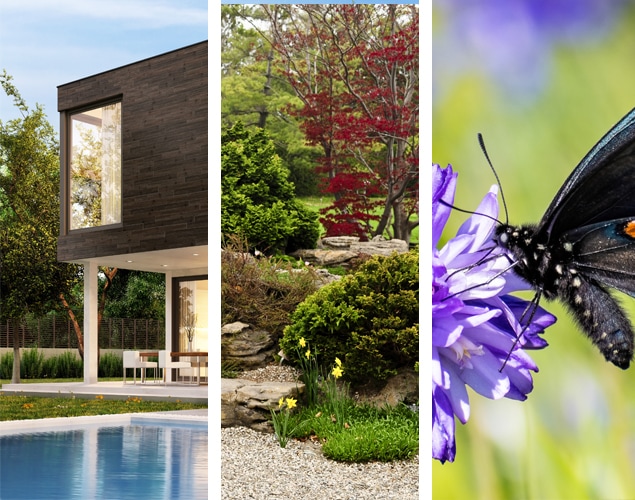
Here in the Northeast, the weather may be frost-laden with midwinter but daydreams of warmer days and time outdoors in our gardens are the perfect moments to take note of the style and aesthetics you are dreaming about. Knowing this can help you shape the look and feel of your gardens to reflect the vibe you are going for. Below are three distinct garden styles, each with their own unique character traits. Browse through and get those juices flowing and see what resonates with you. Selecting a certain style can help you refine your plant palette, select materials, and help in creating the layout of your dream landscape.
Zen Gardens
Our landscapes can be our sanctuaries. Providing reprieve from the busy world, creating meditative spaces requires incorporating layers of elements into our garden designs. By using materials such as smooth stones to create pathways, lanterns, boulders or statuary to provide focal points and water features such as a fountain, small pond or waterfall, you can begin to create a garden of respite. Remember to plan strategic seating areas for contemplation and layer in a plant palette of yews, cedar, spruce, azaleas, ferns, astilbe and Japanese maples, providing the horticultural connection to rest and respite.
Modern Gardens
While modern gardens rely heavily on reinforcing structure, crafting an organized space with a hardscape using warmer materials such as tinted concrete, oiled wood or rusted cor-ten steel can soften the expected contemporary palette of black, gray, and silver. Some of our true plant favorites with bold silhouettes remain Yucca, Canna Lily, Alocasia and Liriope. Yet, there is no reason to feel stuck with rigid architectural plants. Keeping an organized palette where you restrain plant selection to a select color story can be a great way to add looser, more colorful plants into the modern landscape. Bringing a sense of playfulness to a contemporary design a soft palette, such as, Liatris, Sedum Purple Emperor, and New England Aster still uphold a strong intentionality while offering a lightheartedness into the landscape.
Eco-Friendly Gardens
In the interest of connecting people with the Earth and lessening our environmental impact, eco-friendly gardens are founded on an intentional approach to landscaping. There are many ways to responsibly reconnect your gardens further into nature’s cycle of the seasons while creating an attractive and enjoyable garden design. Adopting permaculture techniques and creating space for growing your own food, cutting back or eliminating lawn square footage or use grass alternatives, collecting rainwater and recycling it into your irrigation plan are all eco-conscious considerations. Research native plants in your region and create a low-impact native plant palette, remembering the benefits and needs of wildlife. With the right planning, sustainability and style can go hand in hand.
